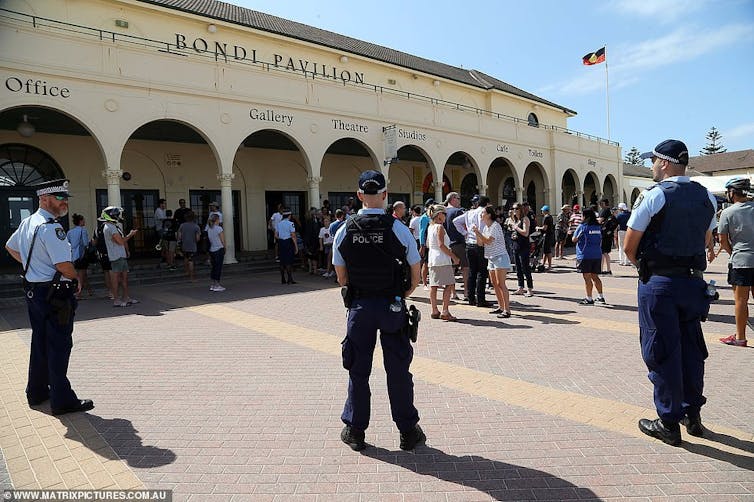Explainer: why police will be crucial players in the battle against coronavirus
- Written by Terry Goldsworthy, Associate Professor in Criminology, Bond University
As coronavirus continues to affect all aspects of life, law enforcement agencies are playing a more pivotal role in enforcing new health and social regulations while ensuring society continues to function in a civil manner.
So why is law enforcement important in our battle against COVID-19, and what role will it play?
Police help contain the virus
Several Australian police services have set up dedicated resources to assist in containing the virus. These include major incident rooms and operations and specific new taskforces.
Victoria has established a 500-strong contingent to compel the closure of all but essential services. As well as the shutdown measures, police and authorised officers will be enforcing mandatory self-isolation periods for anyone entering Victoria from overseas. Under Victoria’s state of emergency, breaking quarantine conditions carries fines of up to A$20,000 for individuals and nearly A$100,000 for businesses.
NSW police can impose on-the-spot fines to enforce social distancing.In New South Wales, police have been required to limit large gatherings in public and restrict access to beaches, removing swimmers and surfers where necessary.
The state government this week granted police enhanced powers to enforce public health orders relating to COVID-19. This includes the power to arrest people breaching their quarantine. Police will be able to compel suspected COVID-19 cases to remain in isolation. The bill will:
allow a police officer to arrest a person who the officer reasonably suspects of contravening a public health order in relation to COVID-19 and returning the person to their usual place of residence or their place of detention.
 NSW Police at Bondi Pavilion after state officials closed the beach.
MATRIXPICTURES.COM.AU
NSW Police at Bondi Pavilion after state officials closed the beach.
MATRIXPICTURES.COM.AU
In conducting similar checks, Victoria Police discovered seven people were not self-isolating as required during spot checks this week.
Such enforcement activity brings with it a unique set of problems. Reports this week indicated up to 200 Victorian police staff are already in quarantine. Concerns were raised about a lack of protective equipment for officers. The powerful Police Association wants a state of disaster declared to free up police to act with greater efficiency and additional powers.
Read more: We need to consider granting bail to unsentenced prisoners to stop the spread of coronavirus
In Queensland, police recruits have been fast-tracked through the academy to provide extra personnel. In addition, Operation Sierra Linnet was launched, a multi-agency taskforce that will ensure compliance with restrictions for all pubs, registered and licensed clubs, gyms, indoor sporting venues, casinos and night clubs.
From midnight Wednesday this week Queensland police have been harnessing their random roadside breath-testing skills to curtail non-approved border crossings.
What impact might coronavirus have on crime?
While police are being asked to extend their range of duties into our everyday activities, in other areas they are pulling back from traditional roles. For example, Queensland police have stopped static random breath test sites because of coronavirus fears.
It is probable police will respond to essential call-outs only, as has happened in some other countries. Even then response times might be longer than before.
We should not be concerned that fewer uniformed police will have an impact on public safety – it is common for police to exercise largely peacekeeping functions. This was highlighted in the Kansas City Patrol Experiment in the 1970s, which found formal police patrols did not impact on crime rates or community fear of crime.
As a consequence of the virus, we have seen criminal elements attempt to take advantage of emerging markets. In the UK, police arrested men who had allegedly stolen toilet paper and hand wash. In Sydney, two men threatened staff with a knife while trying to steal toilet paper.
The strain on our social cohesion is showing, with fights erupting between shoppers as they try to obtain items now in short supply.
In response, the prime minister this week announced his government was creating a new offence to target people hoarding essential goods in an effort to prevent price gouging and exports of products needed to reduce the spread of coronavirus. He said:
These measures will help prevent individuals purchasing goods including face masks, hand sanitiser and vital medicines and either reselling them at significant mark-ups or exporting them overseas in bulk, which prevents these goods from reaching people who need them in Australia.
It isn’t only New York that has two-hour wait queues for firearms and ammunition – consumers are stocking up on ammunition here as well.
What does the future hold?
Trying to predict crime transformations due to coronavirus is difficult. It is likely there will be surges in some crime categories and reductions in others due to conditions created by the crisis.
“Break and enter” offences in private dwellings will probably decline under a widespread lockdown that keeps people in their homes. Alcohol-fuelled violence in public spaces is certain to drop significantly with the closures of pubs, clubs, casinos and restaurants. However, domestic violence incidents are predicted to rise over time, with interpersonal tensions in restricted living arrangements.
Read more: Stay positive, Scott Morrison: when you berate people for bad behaviour, they do it more
Given the uncertainty and the ever-changing situation facing us all, policing needs to be agile and flexible in its response to the needs of society and the demands of governments.
Our law enforcement agencies will perform a critical role in combating the virus and ensuring public safety.
Authors: Terry Goldsworthy, Associate Professor in Criminology, Bond University





